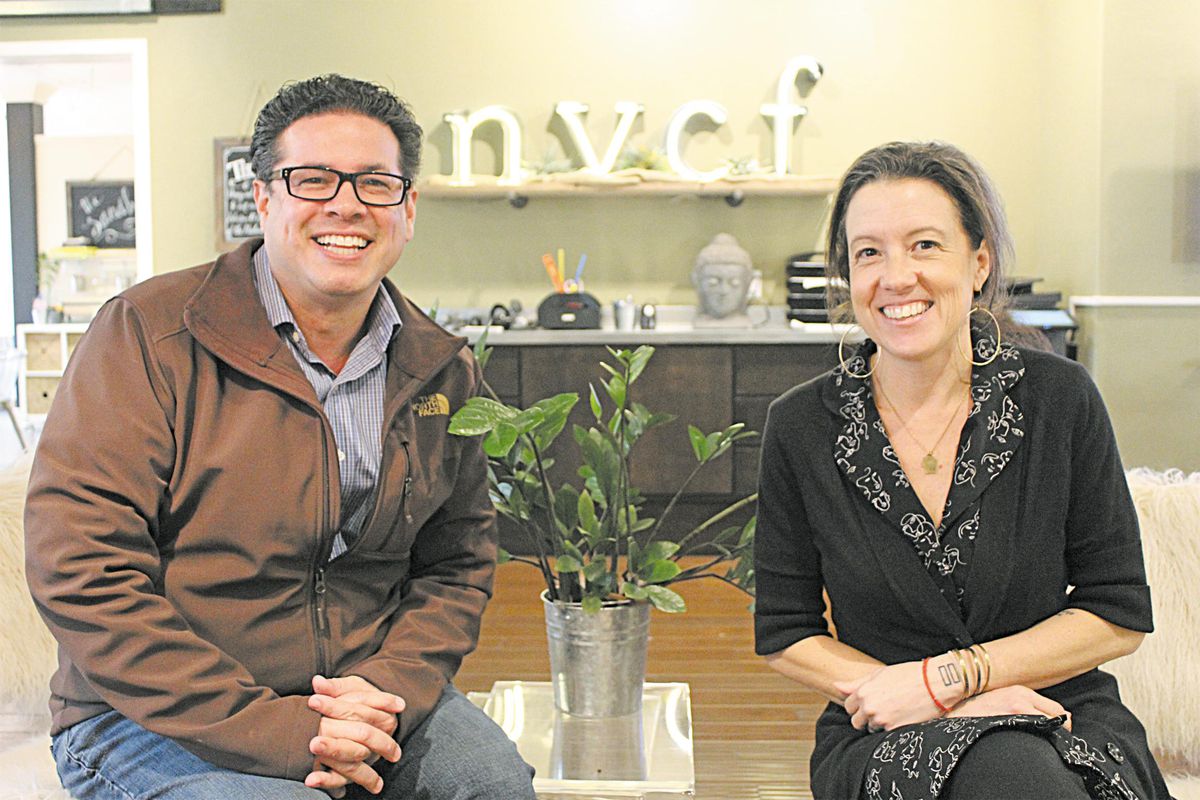
Photo by Ashiah Scharaga
North Valley Community Foundation’s Alexa Benson-Valavanis (right) and Jovanni Tricerri have a major role to play in the Camp Fire recovery: managing $25 million in donations.
In the days following the Camp Fire, donations from across the nation started pouring into a small foundation nestled in downtown Chico.
The Camp Fire Relief Fund swelled to over $1 million seemingly overnight, allowing the North Valley Community Foundation (NVCF) to immediately distribute grants to organizations on the ground. That money provided shelter to evacuees, helped bankroll distribution centers overflowing with donated supplies, and paid for thousands of dollars’ worth of gift cards for people who lost everything.
That was the first phase of relief. Now, two months out, the organization has raised a total of $25 million for the recovery effort, said President and CEO Alexa Benson-Valavanis.
“This business was built on the concept that humans are good and kind and generous,” she said during an interview at the foundation’s downtown office. “For me, it’s just really heartening to see that that’s true. Even now, two months later, we’re still receiving contributions, we’re still receiving crisis support … from the region and from the nation.”
In the next phase of its relief efforts, NVCF has joined forces with Sierra Nevada Brewing Co. and the Aaron Rodgers NorCal Fire Recovery Fund. Under the Butte Strong Fund, they’ll raise money and work together on larger, more long-term projects.
The fund is accepting letters of intent from any organization, group or government entity working in recovery with a meaningful project in mind, Benson-Valavanis said. These projects will have to align with one of the fund’s six key focuses: housing, children and youth services, health and wellness, education, community and economic development, and business recovery.
“We want to hear every single idea imaginable,” Benson-Valavanis said. “The Butte Strong Fund’s role is to either kick-start [a project], or to help finish it off or be a meaningful player within it, but we want it to be collaborative.”
NVCF will facilitate the grant application process, and Butte Strong Fund organizers will evaluate and make final decisions on the proposals that are received. For NVCF’s portion of the fund, there will be a selection committee made up of an advisory board, with experts from the Ridge for each focus area, as well as NVCF staff.
Rodgers has raised $3 million. Sierra Nevada projects it has raised $10 million to $15 million through its relief efforts, which include the collective brewing of Resilience IPA (see “Belly up to the bar,” Chow, Dec. 13). Each will maintain control over where its portion goes.
The bulk of what the brewery has raised will be dedicated to Butte Strong Fund efforts, according to Sierra Nevada spokeswoman Robin Gregory. The brewery anticipates focusing its efforts particularly on business recovery, housing and community development, she said.
“By joining forces with these great partners, we can significantly increase the positive impact on our community,” brewery Vice President Sierra Grossman said in a press release. “The support of our global brewing industry has allowed us to support our Butte County community. It’s been heartwarming to see the light of the human spirit shine through even the darkest of hours.”
In Benson-Valavanis’ perspective, housing is the most important need currently. NVCF is working to identify sites for temporary housing “because of the severity of this crisis and because we understand the limitations around federal funding.”
However, they have encountered major barriers when it comes to finding suitable land, especially since the Ridge and other fire-charred areas still have to go through the debris removal process.
“If we could have 500 temporary houses built right now, we would,” Benson-Valavanis said. “We have to work with so many different players it’s out of our hands, but we are working on it day and night and have been for weeks now.”
Nevertheless, the organization has some leads. Jovanni Tricerri—a longtime communications consultant for the organization who came on board as director for response and recovery after the fire—told the CN&R that NVCF and its partners were scoping out sites suitable for a mix of temporary housing units in Oroville this week. They’ve been looking at other locations throughout Butte County, as well.
Tricerri said they’ve been consulting with the Federal Emergency Management Agency, so that they don’t duplicate efforts, and are focused on serving those who may not qualify for FEMA assistance.
Their role through the Butte Strong Fund could be to pay for infrastructure, leases or the purchase of land, Benson-Valavanis added.
As the organization works to address long-term recovery in the aftermath of the fire, Benson-Valavanis said it will continue to provide funding for immediate relief efforts, such as sheltering and supplies, as needed, as there are organizations that still are helping evacuees in this manner.
Though there remains a lot of uncertainty about how the community will move forward, one thing is clear to the foundation’s leaders: This has to be a collaborative effort. It is too massive of an undertaking otherwise.
“I was struck early on that in order for us to meet the magnitude of this tragedy, we as a community need to work together on a scale that we have never done before,” Tricerri said. “If we move forward 10 years, and look back over 10 years, [my hope is] that we would be able to see a resilient community being rebuilt, and that the Butte Strong Fund would be a catalyst and framework for that rebuilding process.
“It’s a daunting task, it’s a big one, but I think we’re up for it.”
